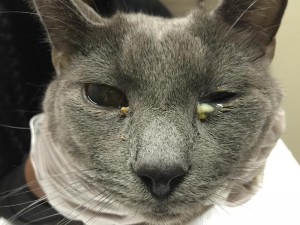UPDATE on the Cat Flu Virus spreading in New York – H7N2!
Categories: Blog
 UPDATE December 15, 2016 – The Health Department of New York and the Animal Care Centers of NYC (ACC) announced that a strain of influenza A virus, known as low pathogenic avian influenza H7N2, has been identified in 45 cats housed at the Manhattan shelter.
UPDATE December 15, 2016 – The Health Department of New York and the Animal Care Centers of NYC (ACC) announced that a strain of influenza A virus, known as low pathogenic avian influenza H7N2, has been identified in 45 cats housed at the Manhattan shelter.
This is the first time this virus has been detected and transmitted among domestic cats. It is unknown how the cats contracted the virus. So far this virus causes mild illness in cats and is thought to pose a low risk to humans. There have been only two documented human cases of low pathogenic avian influenza H7N2 infection in the United States – one in a farmer who worked closely with chickens in 2002 and the other with an unknown source in 2003. Both of these patients recovered.
The Health Department is advising persons who adopted Manhattan shelter cats during this period to call the Department at 866-692-3641 for care instructions, including keeping their cat separated from other cats or animals, if their cat is showing signs of persistent cough, lip smacking, runny nose, and fever. The Health Department is also advising these pet owners to call 866-692-3641 if they develop fever with a sore throat, fever with a cough, or red, inflamed eyes.
This influenza virus is spreading from cat to cat and may be able to spread to other animals and possibly humans. No human infections have been identified to date. To date, ACC has tested 20 dogs at the shelter, and none have contracted this virus. Testing of other animals, including rabbits and guinea pigs, is ongoing. There have been no reported cases of this virus among cats outside of the ACC shelter system.
**************
Can cats get the flu?
We once thought the simple answer was…no.
But this past week we were surprised to learn that cats were found to be infected with the flu virus, influenza A, in New York!
13 cats in New York tested positive for influenza A virus.
We still have a lot to learn about this specific influenza (flu) virus! We are not yet sure how they were infected with the virus, if it is a dog, cat, or even human strain, and how it is spread.
As a quick refresher, the H3N2 canine influenza (flu) virus has been circulating in the US since early 2015 and reports of infections in cats are very rare!
What’s another challenge? The signs of illness in these affected cats were pretty vague! Common signs of illness included a runny nose, congestion and general lethargy. These are pretty darn similar to the simple, common, upper respiratory infection seen in cats!
If you think your cat is not feeling well with signs of illness such as lethargy, sneezing, coughing, a runny nose, or fever, please contact your veterinarian. While it is still likely this is a simple upper respiratory infection, this new information about the flu virus in cats has everyone on edge and we are being proactive about evaluation and treatment!
Knowledge is power!
Garret Pachtinger, VMD, DACVECC
Board Certified Emergency and Critical Care Specialist
Co-Founder, VETgirl

No comments yet.